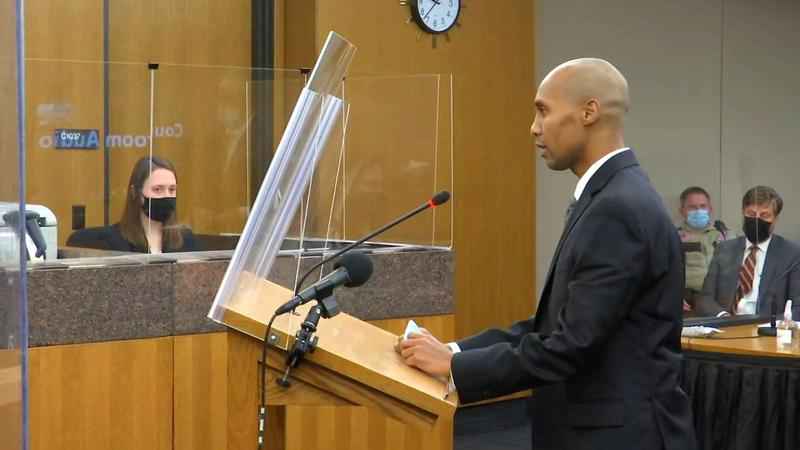‘What has changed?’ Judge comments on broader police reform during resentencing of Mohamed Noor
[anvplayer video=”5065164″ station=”998122″]
Former Minneapolis Police officer Mohamed Noor was resentenced Thursday for the 2017 shooting death of Justine Ruszczyk Damond.
A jury convicted Noor of third-degree murder and second-degree manslaughter in 2019. He was serving 12.5 years for the higher charge but the Minnesota Supreme Court overturned that murder conviction last month.
Judge Kathryn Quaintance resentenced Noor to just under five years in prison on the lower second-degree manslaughter charge. She said he will receive credit for the time he’s served already.
According to the Department of Corrections website, Noor is expected to be released on June 27, 2022.
“The rule in Minnesota is that two-thirds of that time is in prison and the last one third is on supervised release, provided there’s good behavior in prison, which there is here,” said Mark Osler, the Robert and Marion Short Distinguished Chair in Law at the University of St. Thomas School of Law. “That means that his sentence effectively is going to be 38 months in prison with 19 months in the community. […] There is that 19 months of supervised release and so it’s not that he’s going to be able to just do whatever he wants.”

Mohamed Noor stands before being resentenced on Oct. 21, 2021.[KSTP]
Quaintance imposed the maximum sentence under the guidelines, which allows for 41 to 57 months for a second-degree manslaughter conviction.
“Mr. Noor, I am not surprised you have been a model prisoner, however, I do not know of any authority that would make that grounds for reducing your sentence,” she said. “You did shoot across the nose of your partner, you did endanger a bicyclist and residents of a community of surrounding houses on a summer Saturday evening. One household was entertaining guests on a porch adjacent to the gunfire. These factors of endangering the public make your crime of manslaughter appropriate for a high end of the guidelines.”
Osler said while Noor may try to appeal the 57-month sentence, it likely won’t be successful.
“He’s already gotten a huge discount from your original sentence and because she sentenced within the guideline range, that means it’s really unlikely that sentence is going to be seen as unreasonable,” Osler said.
The remarks by Quaintance lasted about six minutes, during which she also addressed the broader issue of police reform in Minneapolis.
She started her comments by sharing recollections of Noor’s original sentencing in 2019.
“On July 7, I said the primary concern of the jurors who heard the testimony in this case, when I spoke to them after the verdict, was ‘Will there be changes? Change is needed,’” she said. “’Will some of these supervising officers be fired, or disciplined? Is what we saw normal for the Minneapolis Police Department and the Bureau of Criminal Apprehension? How will this be prevented from happening again?’”
Quaintance went on to add, “The victim’s family and some of the witnesses, including some officers, have expressed concerns. A large amount of tax payer dollars will go to Australia but Minneapolis residents await the promised transformation and the questions of the jurors remain unanswered. What has changed? What will change so that this does not happen again? How does the department address officer safety without jeopardizing public safety. The jurors and the people of Minneapolis need and deserve answers.”
Osler said it’s unusual for a judge to offer such a perspective during sentencing.
“Usually, judges are going to confine their comments to what’s directly in front of them, the risk or the benefits for lesser sentence things like that,” he said. “But here, obviously there is a larger context.”
Quaintance also referenced the murder of George Floyd.
She said, “Since we last met, another person has died at the hands of police after two other rookies responded together in a squad to a low-risk situation which escalated. The community exploded, another police officer has been on trial for murder.”
KSTP asked Osler whether this could have any implications for the court proceedings involving the former officers charged for Floyd’s death.
“I don’t think in a direct way,” Osler said. “But I can understand her saying [that]. We all want our work to matter and I think she wanted the work that they had done in their case, the sentencing that had been issued previously, to deter the kind of behavior that we saw in the [Derek] Chauvin case and obviously it didn’t.”
He said it’s possible attorneys for those other officers may use her comments to argue for a change of venue for the upcoming trial in March. Osler said, however, “I don’t think it’s going to make a difference.”
According to Osler, it’s also unlikely Quaintaince’s comments will be used by Noor’s attorney for an appeal of the sentence.
“I don’t think so, we’ll see,” he said. “An appeal probably would not be completed before he finishes the [prison] term.”
5 EYEWITNESS NEWS reached out to the city of Minneapolis, Minneapolis Mayor Jacob Frey and the Minneapolis Police Department for a response to the judge’s comments but no one provided a statement thus far.